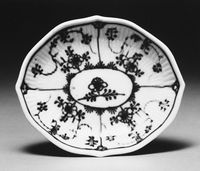
Two double standing cups (trussing cups)
Simon Pissinger
An item at Metropolitan Museum of Art
Double cups like this one, which detach at the center to be used as separate goblets, were employed to celebrate both political and matrimonial unions. These cups were part of a silver cache discovered in 1869 in the false wall of a Regensburg home, where they had been hidden in the 1630s to protect them from looting during the Thirty Years’ War, one of the most destructive conflicts in European history. Starting in 1618, the intermittent warfare involved all major powers fighting for religious, dynastic, and commercial causes, transforming Central Europe into ruinous battlefields until 1648.
European Sculpture and Decorative Arts
An exhibit at Metropolitan Museum of Art
The fifty thousand objects in the Museum's comprehensive and historically important collection of European sculpture and decorative arts reflect the development of a number of art forms in Western European countries from the early fifteenth through the early twentieth century. The holdings include sculpture in many sizes and media, woodwork and furniture, ceramics and glass, metalwork and jewelry, horological and mathematical instruments, and tapestries and textiles. Ceramics made in Asia for export to European markets and sculpture and decorative arts produced in Latin America during this period are also included among these works.




